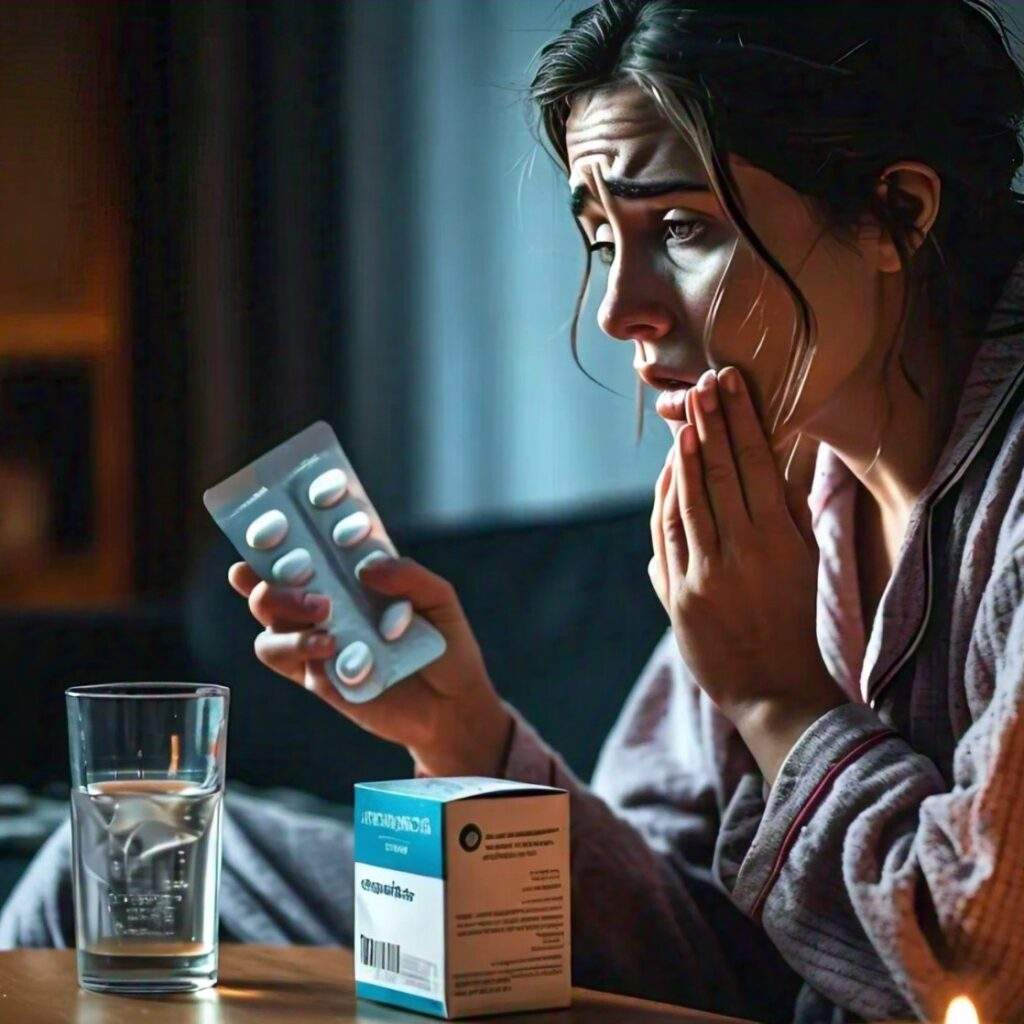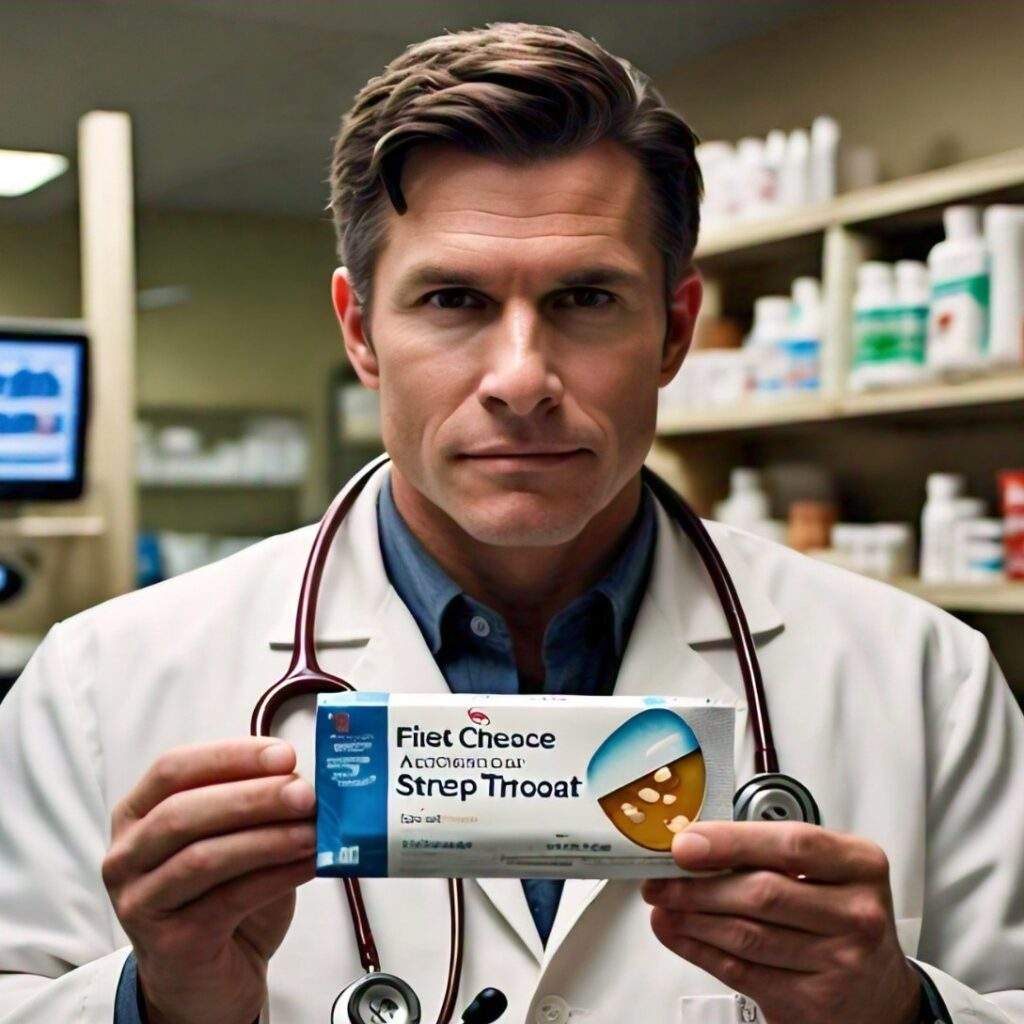Strep throat, or streptococcal pharyngitis, is a bacterial infection caused by Group A Streptococcus (GAS). It primarily affects the throat and tonsils, causing inflammation and discomfort. Common symptoms of strep throat include:
- Sudden and severe sore throat
- Painful swallowing
- Red and swollen tonsils with white patches
- Fever over 101°F (38.3°C)
- Swollen and tender lymph nodes in the neck
- A general feeling of illness
The Importance of Antibiotic Treatment
If left untreated, strep throat can lead to complications like kidney inflammation, rheumatic fever, and sinus infections. Antibiotics play a crucial role in treating strep throat by:
- Reducing the duration and severity of symptoms
- Preventing the spread of infection to others
- Decreasing the risk of complications
Recommended Readings:
- Over The Counter Antibiotics For Sinus Infection
- Best Antibiotic For Cough For Adults | Antibiotics For Cough And Cold
- List Of Strongest Antibiotics For Bacterial Infection | Antibiotics Tablets
- List Of Over The Counter Antibiotics | OTC Antibiotics
Best Antibiotic For Throat Infection

Table Of Contents
What is Strep Throat?
Definition and Causes
Strep throat, also known as streptococcal pharyngitis, is a bacterial infection caused by Streptococcus pyogenes (Group A Streptococcus). It is a highly contagious infection that affects the throat and tonsils, causing inflammation and discomfort.
Distinguishing Strep Throat from Other Sore Throat Conditions
Strep throat differs from other sore throat conditions, such as viral pharyngitis, in its severity and potential for complications. Unlike viral sore throats, strep throat is caused by a bacterial infection, requiring antibiotic treatment to prevent further complications.
Symptoms of Strep Throat
Adults:
- Severe sore throat
- Painful swallowing
- Red and swollen tonsils with white patches
- Fever over 101°F (38.3°C)
- Swollen and tender lymph nodes in the neck
- A general feeling of illness
- Headache
- Nausea and vomiting (less common)
Children:
- Severe sore throat
- Painful swallowing
- Red and swollen tonsils with white patches
- Fever over 101°F (38.3°C)
- Swollen and tender lymph nodes in the neck
- The general feeling of illness
- Abdominal pain
- Vomiting
Complications of Untreated Strep Throat
If left untreated, strep throat can lead to serious complications, including:
- Rheumatic Fever: An inflammatory disease that can affect the heart, joints, and skin
- Kidney Inflammation (Glomerulonephritis): A condition that can lead to kidney damage and failure
- Sinus Infections
- Ear Infections
- Tonsillitis
- Abscesses
Prompt antibiotic treatment is essential to prevent these complications and ensure effective recovery.
Why Antibiotics Are Essential For Strep Throat
Note: Antibiotic treatment should only be initiated under the guidance of a healthcare professional, as they will determine the most appropriate antibiotic and dosage based on individual circumstances.

How Antibiotics Work
Antibiotics are crucial in treating strep throat as they directly target the bacterial infection, Streptococcus pyogenes. Antibiotics work by:
- Inhibiting bacterial cell wall formation, ultimately leading to cell death
- Interfering with protein synthesis, essential for bacterial growth
- Reducing the severity and duration of symptoms
Early Treatment is Key
Early antibiotic treatment is vital to prevent complications, such as:
- Rheumatic fever
- Kidney inflammation (Glomerulonephritis)
- Sinus infections
- Ear infections
Most Effective Antibiotics for Strep Throat
The following antibiotics are commonly used to treat strep throat:
| Antibiotic | Dosage | Duration |
|---|---|---|
| Penicillin (Amoxicillin) | 250-500 mg, 2-3 times/day | 10 days |
| Amoxicillin-Clavulanate (Augmentin) | 250-500 mg, 2-3 times/day | 10 days |
| Azithromycin (Zithromax) | 250-500 mg, once/day | 5 days |
| Clarithromycin (Biaxin) | 250-500 mg, 2 times/day | 10 days |
First Choice Antibiotics For Strep Throat
Penicillin and Amoxicillin
- Safety: They have a long history of safe use, with minimal side effects.
- Effectiveness: Penicillin and amoxicillin are highly effective against Streptococcus pyogenes, with cure rates of 90-100%.

Dosage Guidelines:
- Adults: 250-500 mg of amoxicillin, 2-3 times/day for 10 days.
- Children: 25-50 mg/kg of amoxicillin, 2-3 times/day for 10 days.
Azithromycin
- When prescribed: For patients with penicillin allergies or intolerances.
- Effectiveness comparison: Azithromycin has a slightly lower cure rate (85-90%) compared to amoxicillin.
- Dosage and treatment duration: 250-500 mg once/day for 5 days.
Cephalosporins
- When used: For recurrent infections or treatment failures with first-line antibiotics.
- Comparison with other first-line antibiotics: Cephalosporins have similar effectiveness to penicillin and amoxicillin but may have more side effects.
Alternative And Second-Line Antibiotics For Strep Throat
Clindamycin
- Situations where clindamycin is used:
- Resistant strains of Streptococcus pyogenes
- Severe infections or complications
- Patients with severe penicillin allergies
- Dosage: 300-600 mg, 3 times/day for 10 days
Augmentin (Amoxicillin-Clavulanate)
- When Augmentin is preferred over standard amoxicillin:
- Resistant strains of Streptococcus pyogenes
- Patients with concurrent sinus or ear infections
- Those who have previously failed amoxicillin treatment
- Dosage: 250-500 mg, 2-3 times/day for 10 days
Erythromycin
- Use: For patients allergic to penicillin and cephalosporins
- Dosage: 250-500 mg, 2-4 times/day for 10 days
Macrolides
- Azithromycin: 250-500 mg, once/day for 5 days
- Clarithromycin: 250-500 mg, 2 times/day for 10 days
Fluoroquinolones
- Levofloxacin: 500-750 mg, once/day for 10 days
- Ciprofloxacin: 500-750 mg, 2 times/day for 10 days
Lincosamides
- Clindamycin: 300-600 mg, 3 times/day for 10 days
Sulfonamides
- Trimethoprim-Sulfamethoxazole: 160-800 mg, 2 times/day for 10 days
Cephalosporins
- Cephalexin: 250-500 mg, 2-3 times/day for 10 days
- Cefaclor: 250-500 mg, 2-3 times/day for 10 days
Effectiveness Of Antibiotics: What To Expect
Remember, antibiotics only work against bacterial infections, not viral infections. Always consult your healthcare provider for proper diagnosis and treatment.

Timeline of Recovery with Antibiotics:
- 24-48 hours: Symptoms start to improve, such as reduced fever and sore throat
- 3-5 days: Significant improvement in symptoms, with reduced pain and inflammation
- 7-10 days: Most patients experience complete recovery from strep throat
What to Do if Symptoms Persist After Starting Antibiotics:
- Contact your healthcare provider: If symptoms worsen or do not improve within 48-72 hours
- Complete the full treatment course: Even if symptoms improve, finish the entire antibiotic course
- Potential need for alternative antibiotics: If symptoms persist, your healthcare provider may switch to a different antibiotic
Additional Tips:
- Rest and hydration: Support your recovery with plenty of rest and fluids
- Pain management: Use over-the-counter pain relievers, such as acetaminophen or ibuprofen, as directed
- Follow-up appointment: Schedule a follow-up appointment with your healthcare provider to ensure complete recovery
Best Practices For Antibiotic Use
Remember, always consult your healthcare provider for proper diagnosis and treatment. They will determine the best course of action for your specific situation.

Importance of Completing the Full Course of Antibiotics:
- Ensure complete recovery: Finish the entire course to eradicate the infection
- Prevent relapse: Reduce the risk of the infection returning
- Prevent antibiotic resistance: Help prevent the development of resistant bacteria
Risks of Antibiotic Resistance:
- Ineffective treatment: Antibiotics may not work against resistant bacteria
- Prolonged illness: Infections may last longer, causing more severe symptoms
- Increased risk of complications: Resistant infections can lead to serious complications
When to Seek Emergency Treatment:
- Difficulty swallowing: Severe pain or inability to swallow
- Shortness of breath: Difficulty breathing or rapid breathing rate
- High fever: Fever above 103°F (39.4°C)
- Severe headache: Sudden, severe headache or stiff neck
Emergency Treatment for Strep Throat:
- Intravenous antibiotics: Immediate administration of antibiotics through a vein
- Hospitalization: Close monitoring and treatment in a hospital setting
- Supportive care: Fluids, oxygen, and pain management as needed
Antibiotics For Strep Throat In Pakistan
Please note that antibiotic resistance patterns and availability may vary across different regions and healthcare settings. Always consult a healthcare professional for proper diagnosis and treatment.

Best Antibiotic for Throat Infection in Pakistan:
- Amoxicillin: Most commonly prescribed and effective against strep throat
- Penicillin: Also effective, but may have higher resistance rates
Availability of Antibiotics in Pakistan:
- Wide availability: Antibiotics are widely available in Pakistan, including in rural areas
- Generic options: Many generic antibiotics are available, making treatment more affordable
Commonly Prescribed Antibiotics in Pakistan:
- Amoxicillin: 500mg, 3 times/day for 10 days
- Penicillin: 250-500mg, 2-3 times/day for 10 days
- Cefixime: 200-400mg, once/day for 10 days (for patients allergic to penicillin)
Regional Variations:
- Urban areas: Tend to have better access to newer antibiotics and more frequent prescribing of amoxicillin
- Rural areas: May have higher use of traditional remedies and older antibiotics like penicillin
Strep Throat Treatment Without Antibiotics
Note: If symptoms persist or worsen, consult a healthcare professional for proper diagnosis and treatment. Antibiotics may be necessary for severe or bacterial cases.

Situations Where Antibiotics Might Not Be Necessary:
- Mild cases: Symptoms are mild and self-limiting
- Viral infections: Strep throat is caused by a virus, not bacteria
- Allergic reactions: Some cases may be allergic reactions, not infections
Natural Remedies and Supportive Care:
- Rest and hydration: Plenty of rest and fluids to help the body recover
- Pain management: Over-the-counter pain relievers like acetaminophen or ibuprofen
- Throat soothers: Warm salt water gargles, honey, and lemon
- Slippery elm: A natural demulcent to soothe the throat
How to Get Rid of Strep Throat Overnight: Myth vs. Reality
- Myth: There is no instant cure or overnight solution
- Reality: Strep throat takes time to recover, even with antibiotics
- Best approach: Focus on supportive care, rest, and hydration to help manage symptoms
Frequently Asked Questions (FAQs) – Antibiotics For Strep Throat
What are the symptoms of strep throat?
Sudden, severe sore throat
Pain when swallowing
Fever
White or yellow patches on tonsils
Swollen, tender lymph nodes
What kills a sore throat fast?
Warm salt water gargles: Several times a day to reduce swelling and kill bacteria
Honey: Soothes the throat and has antimicrobial properties
Slippery elm: Forms a protective barrier to reduce inflammation
Throat lozenges: Lozenges containing ingredients like menthol, eucalyptus, or honey
Is azithromycin good for strep throat?
Yes: Azithromycin is an effective antibiotic for treating strep throat, especially for those allergic to penicillin.
Which is the best tablet for throat infection?
Amoxicillin: Most commonly prescribed and effective against strep throat
Penicillin: Also effective, but may have higher resistance rates
Azithromycin: Good alternative for those allergic to penicillin
How long does strep throat last?
7-10 days: Typical duration with antibiotic treatment
10-14 days: Without antibiotic treatment, symptoms may last longer
Strep throat symptoms in adults
Sudden, severe sore throat
Pain when swallowing
Fever
White or yellow patches on tonsils
Swollen, tender lymph nodesStrep throat pictures (informative)
Tonsillitis: White or yellow patches on tonsils, swollen and red
Throat redness: Inflamed throat with visible blood vessels
Lymph node swelling: Tender, swollen lymph nodes in the neck
How is strep throat diagnosed?
Throat swab test
Rapid strep test (RST)
Culture test
Can strep throat be treated at home?
Yes, with rest, hydration, and over-the-counter pain relievers
Antibiotics may be necessary for severe or bacterial cases
What are the complications of strep throat?
Kidney inflammation (post-streptococcal glomerulonephritis)
Rheumatic fever
Tonsillitis
Ear infections
Can strep throat be prevented?
Practice good hygiene (frequent handwashing)
Avoid close contact with infected individuals
Stay home from work or school if symptoms occur
What is the difference between strep throat and tonsillitis?
Strep throat is a bacterial infection, tonsillitis can be viral or bacterial
Strep throat typically has a sudden onset, tonsillitis can develop gradually
Can strep throat occur in adults?
Yes, although it is more common in children and teenagers
Can strep throat be treated with natural remedies?
Some natural remedies like honey, slippery elm, and warm saltwater gargles may help alleviate symptoms
Antibiotics may still be necessary for severe or bacterial cases
Final Advice:
- Practice good hygiene (frequent handwashing, avoiding close contact with infected individuals)
- Stay home from work or school if symptoms occur
- Seek medical help if:
- Symptoms worsen or last longer than expected
- Fever exceeds 101°F (38.3°C)
- Difficulty swallowing or breathing occurs
- Rash or swollen lymph nodes appear
Remember, while antibiotics can effectively treat strep throat, consulting a healthcare provider is crucial for proper diagnosis and treatment. By taking preventative measures and seeking medical help when necessary, you can reduce the risk of complications and ensure a speedy recovery.
………………………….
Disclaimer:
Commissions we earn from partner links on this page do not influence our content. Our editorial content is based on thorough research and insights from qualified medical professionals to ensure the highest standards of accuracy and reliability.
Information provided on Doseway is for educational purposes only. Your health and wellness are unique to you, and the products and services we review may not be suitable for your circumstances. We do not offer personal medical advice, diagnosis, or treatment plans. For specific advice, please consult with a healthcare professional. Doseway adheres to strict editorial integrity standards. To the best of our knowledge, all content is accurate as of the date posted, though offers and information may change. The opinions expressed are the author’s own and have not been influenced, approved, or endorsed by our partners.
……………………………..

 Cart is empty
Cart is empty
Add a Comment